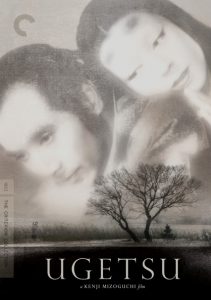Ugetsu-1953
Director Kenji Mizoguchi
Starring Masayuki Mori, Machiko Kyo
Scott’s Review #1,147
Reviewed May 31, 2021
Grade: A
Kenji Mizoguchi, who directed the brave Japanese masterpiece Ugetsu (1953), successfully brought Eastern cinema to Western audiences when the film was discovered. The result is a groundbreaking ghost story that gorgeously fuses reality with the supernatural.
It’s not always clear what is going on, but in only the best of ways. It’s like being inside a dream.
The notice is long overdue, as Mizoguchi has been making films since the 1920s! But his forever stamp on cinema is worth the wait, and Ugetsu is a timeless treasure.
Ugetsu is not the most straightforward plot to follow, but that is fine because its brilliance lies in other areas. Like every area, to be precise.
The cinematography, the mix of reality and the supernatural, the tone, the questioning messages, and the character conflict all add muscle.
It’s cinema to be experienced and mesmerized by. Haunting, sad, and stoic, it explores themes such as war, family, and forbidden relationships.
Its cultural exploration is essential, and it teaches Japanese customs. This film taught me what great cinema is—not necessarily linear or explained, but drenched with brilliance, thoughtfulness, and art. I was able to escape the confines of traditionally constructed films, and it was an awakening in pleasure and creativity.
The lesson learned is that cinema knows no boundaries, and the film helped open my eyes to types and styles of films that may be deemed onerous.
Drawing its plot, particularly from Ueda’s tales “The House in the Thicket” and “The Lust of the White Serpent,” the film is set in Azuchi–Momoyama period Japan (1573–1600). Mizoguchi was fascinated and inspired by these fables and the supernatural style from the long-ago, powerful, and classic stories.
A peasant farmer and potter, Genjūrō (Masayuki Mori) leaves his wife and young son behind during the civil war and is seduced by a spirit that threatens his life. He finds himself at a Kutsuki mansion to sell his pottery.
The mansion is run by fabulous Lady Wakasa (Machiko Kyo), who seduces him and requests that he marry her.
But is Lady Wakasa real or a ghost from the past? She harbors a horrific secret.
A subplot involves Genjūrō’s friend, Tōbei (Eitaro Ozawa), who dreams of becoming a great samurai and chases this goal at the unintended expense of his wife. He steals the head of a well-known general and is rewarded with shiny armor. Eager to tell his wife, he finds her working at a local brothel.
The costumes specifically deserve a shout-out. Drenched in Japanese drawings and colors, they are exquisite to the eye despite Ugetsu being a black-and-white film. The apparent art looks better without color adding mystique.
My favorite visual is when two couples drift along in a boat on a tremendous lake. Amid fog and haze, the scene is gloomy yet magnificent, offering lush Japanese geography. It’s a breathtaking visual with a fabulous texture and tone that, once again, is aided by black-and-white filmmaking.
The ghost story also is aided by the black and white cinematography. Isn’t everything? The scenes seem to scroll by in a fusion of live-action and gorgeous landscapes.
It is up for debate what is reality and what is not, which adds to the confusion and overall beauty.
The humanity and moral conflict the two main characters face are hearty and worthy of discussion. They strive for great success and riches but live in a cruel world.
I found the men to be heroes. Ugetsu is as much a character study as it is an art film.
Ugetsu (1953) is a must-see for film lovers and those intrigued by other cultures. If it is not already, it should appear on lists of superior films shown at film schools.
Oscar Nominations: Best Costume Design, Black and White
